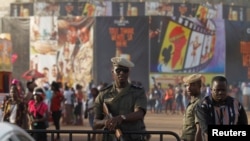President of FESPACO's organizing committee, Fidele Aymar Tamini, said the festival's 28th edition embraced the theme of "African cinemas and peace cultures" in the context of the crisis.
FESPACO, Africa’s largest film festival, featured films 100 films selected to compete from 35 Africa countries as well as the diaspora, with movies from the Dominican Republic and Haiti.
More than 15,000 people attended the event including African cinema celebrities from Nigeria, Senegal and Ivory Coast.
Burkinabe actress Maimouna Ndiaye, who had four submissions in this year's competition, said the festival is a release from reality.
"We only have FESPACO left to prevent us from thinking about what’s going on,"Ndiaye said. "This is the event that must not be canceled no matter the situation."
This year offered a space for filmmakers to underscore the realities central the region, including heroines in the anti-jihadist fight, a subject that has become central in recent years in the Sahel.
"When we talk about terrorism, we don't talk a lot about women," Burkinabe director Apolline Traoré said.
Traoré's "Sira," chosen as an "official selection" for fiction feature film at the festival, chronicles a 25-year-old girl kidnapped by jihadists, who shows courage and intelligence to survive in the horror.
In general, "when we talk about women, they are victims in the camps for the displaced, we don't see their actions," Traoré said.
Burkinabe actress Nafissatou Cissé said through the character of Sira, she wanted to "give a voice" to women and embody "hope." "I must have felt the rage and other emotions of these women," Cissé told AFP.
In her short film "L'envoyée de Dieu - The Envoy of God," Nigerian director Amina Mamani said she also wanted to show the power of women in the face of the jihadist violence that is also affecting her country.
In the film, the main character, a ten-year-old girl, is kidnapped in the middle of the night by jihadists to carry out a suicide attack on a market, but she decides otherwise.
"Terrorists use women. Men get killed, but women are kidnapped, forced into marriage and raped, when young girls are chosen to blow themselves up," Mamani said.
The prime minister of neighboring Mali, the festival's guest country of honor which is also grappling with a bloody jihadist insurgency, said culture had an "avant-garde role to play in the peace process."
Government officials say they ramped up security to ensure the safety of festival attendees.
Traoré remained upbeat about her country's prospects.
"The world has painted Burkina Faso as a red country. It's dangerous to come to my country, as they say," she said. "We’re probably a little crumbled but we’re not down."
Wolfram Vetter, the European Union ambassador in Burkina Faso, called the film festival "an important contribution to peace and reconciliation in Burkina Faso and beyond."
Since the bi-annual festival was last held in 2021 the West African nation has had to deal with the political fallout from two coups within eight months and spiraling violence driven by groups linked to al-Qaeda and Islamic State.
Information for this report came from Associated Press, Agence France-Presse and Reuters.
